Tools Required
J 41427 Engine Lift
Bracket
Removal Procedure
- Remove the coolant Recovery Reservoir. Refer to
Coolant Recovery Reservoir Replacement
.
- Disconnect Negative battery cable. Refer to
Battery Negative Cable Disconnection and Connection
.
- Remove the engine cover. Refer to
Engine Cover Replacement
.
- Remove Air Cleaner assembly. Refer to
Air Cleaner Assembly Replacement
.
- Remove the front bumper. Refer to
Front Bumper Replacement
.
- Remove the grille. Refer to
Grille Replacement
.
- Remove the Radiator Support. Refer to
Radiator Support Replacement
.
- Remove the A/C Condenser. Refer to
Condenser Replacement
.
- Remove the Radiator. Refer to
Radiator Replacement
.
Caution: In order to avoid possible injury or vehicle damage, always replace
the accelerator control cable with a NEW cable whenever you remove the engine
from the vehicle.
In order to avoid cruise control cable damage, position the cable out
of the way while you remove or install the engine. Do not pry
or lean against the cruise control cable and do not kink the cable. You must
replace a damaged cable.
- Remove the accelerator control cable. Refer to
Accelerator Control Cable Replacement
in Engine
Controls.
- Remove the cruise control cable, if equipped from the throttle
shaft and the accelerator control cable bracket. Refer to
Cruise Control Cable Replacement
in Cruise Control.
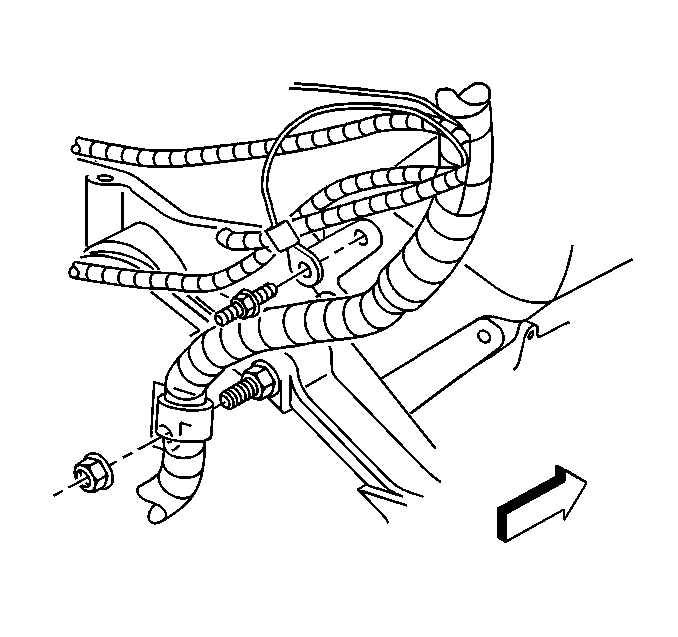
- Remove the stud and bolt
holding the ground wires to the rear of both cylinder heads.
- Remove the nut holding the wiring harness at the transmission
to engine stud.

- Disconnect the following
electrical connectors:
| • | The throttle position (TP) sensor (1) |
| • | The idle air control (IAC) motor (2) |
| • | The engine coolant temperature (ECT) gage sensor (3) |
| • | The A/C high pressure switch (4), if equipped |
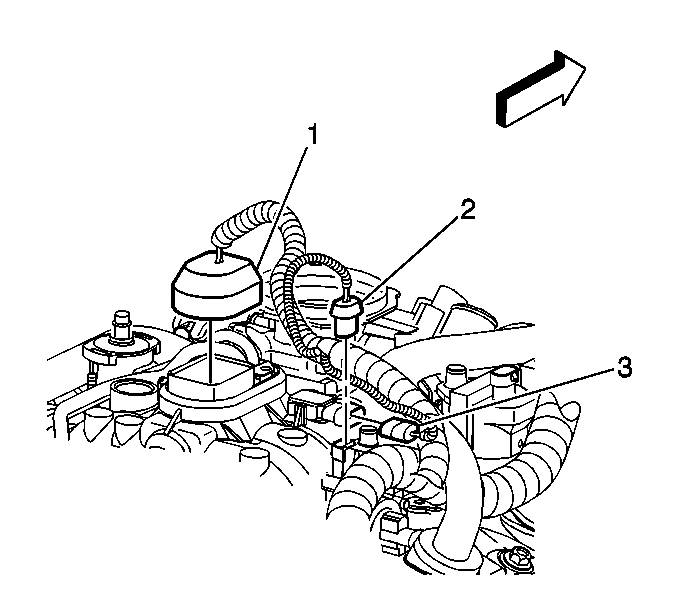
- Disconnect the following
electrical connectors:
| • | The fuel meter body assembly connector (1) |
| • | The EVAP canister purge solenoid valve (2) |
| • | The manifold absolute pressure (MAP) sensor (3) |
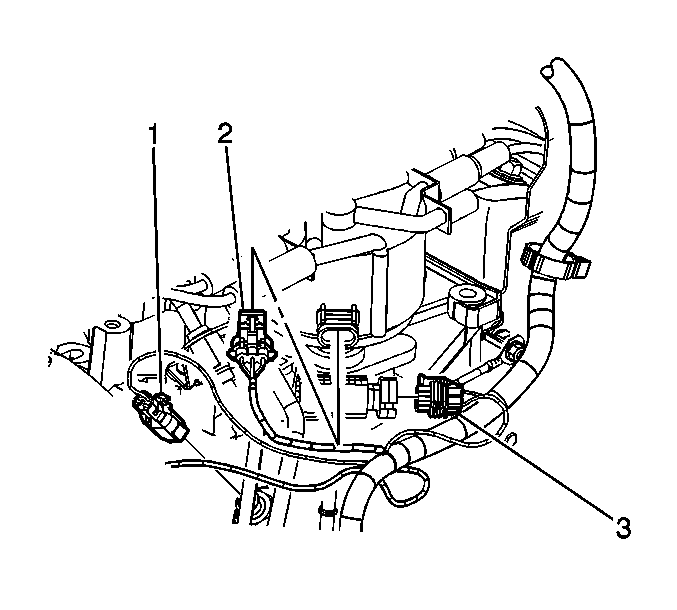
- Disconnect the following
electrical connectors:
| • | The engine oil pressure sensor (3) |
| • | The knock (KS) sensor (1) |

- Disconnect the following
electrical connectors:
| • | The A/C compressor clutch (1), if equipped |
| • | The engine coolant temperature (ECT) sensor (3) |
- Remove the ground wire (4) from the stud at the water outlet.
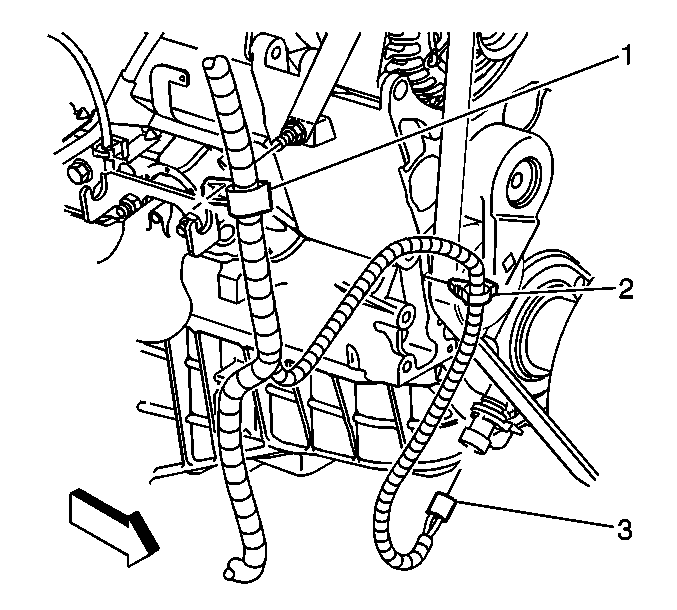
- Disconnect the crankshaft
position (CKP) sensor (3).
- Remove the engine wiring harness clip (1) from the stud
on the generator mounting bracket.
- Remove the engine wiring harness clip (2) at the front
of the engine.
- Move the engine wiring harness aside.
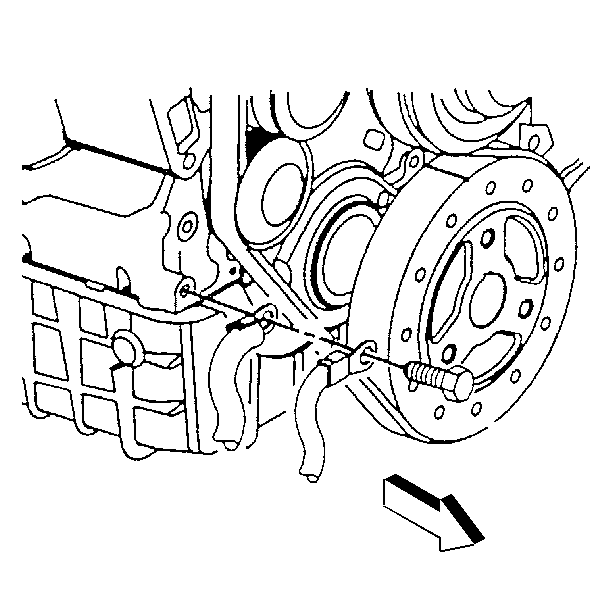
- Remove the bolt holding
the battery negative cable and the ground strap to the front of the engine.
- Remove the generator mounting bracket.
- Remove the heater hoses from the engine . Refer to
Heater Inlet Hose Replacement
and
Heater Outlet Hose Replacement
in Heating and
Ventilation (Non-A/C).
- Remove the radiator inlet and outlet hoses. Refer to the following
procedures:
- Remove the A/C compressor pipes from the vehicle. Refer to
Compressor Hose Assembly Replacement
in Heating
Ventilation and Air Conditioning.
- Remove the power steering pump mounting bracket.
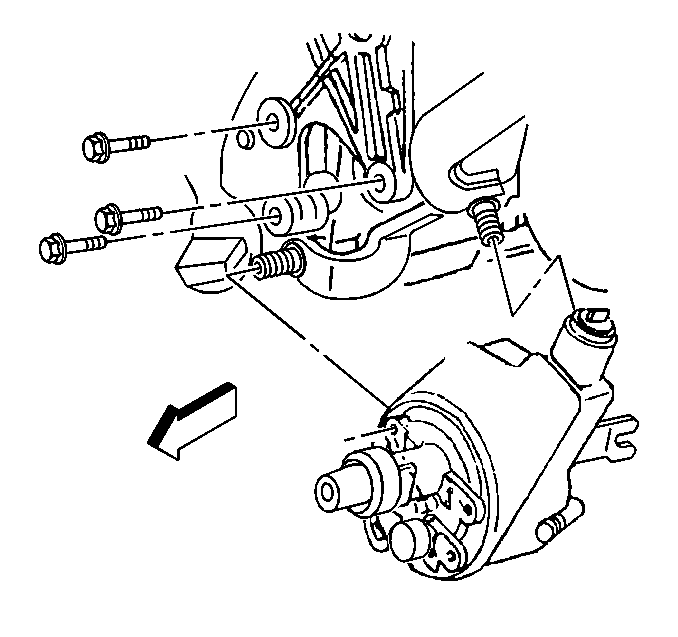
- Remove the power steering
pump rear mounting bracket from the engine. Set the pump aside.
- Remove the distributor. Refer to
Distributor Replacement
in Engine Controls - 4.3L.
- In order to allow access for the lifting device, remove the upper
intake manifold. Refer to
Upper Intake Manifold Replacement
.
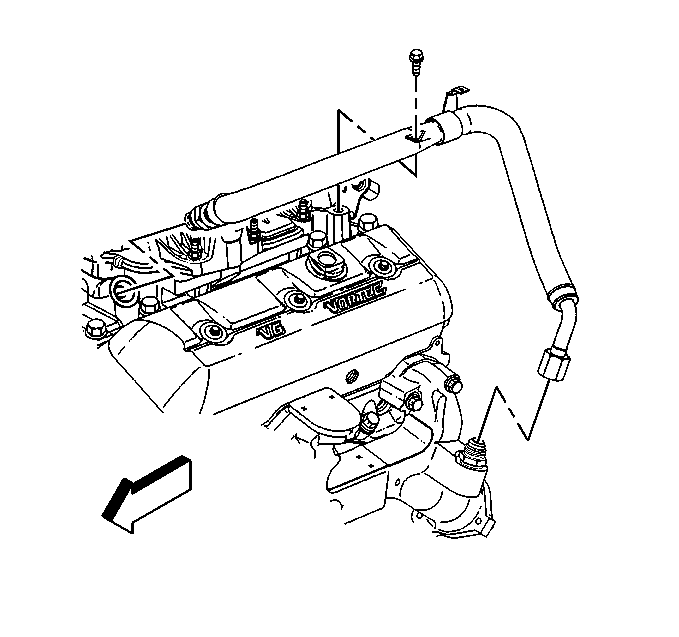
- Remove the spark plug
wire harness retainer from the exhaust gas recirculation (EGR) valve inlet
pipe.
- Remove the clamp bolt for the EGR valve inlet pipe.
- Remove the EGR valve inlet pipe from the intake and the exhaust
manifolds.
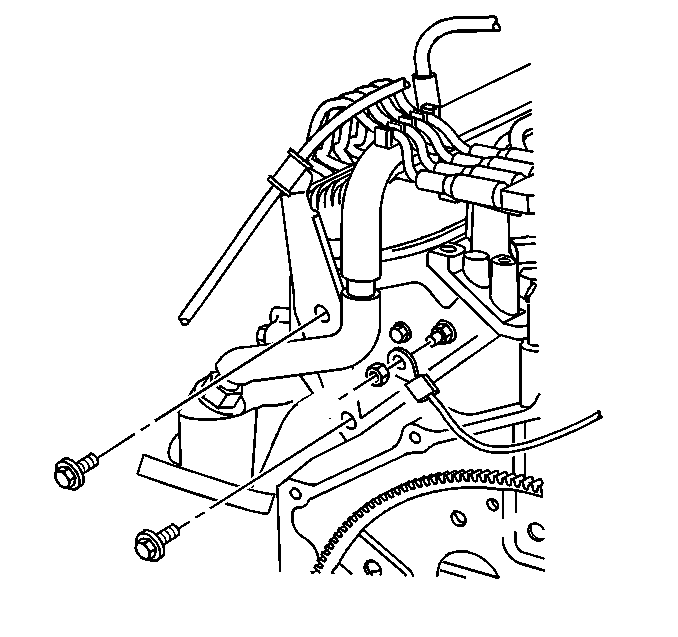
- Remove the transmission
control cable bracket from the rear of the left cylinder head.
Notice: Remove the AIR pipes before engine removal. The AIR pipes can break
or damage easily causing erratic engine operation.
- Remove both AIR pipes from the engine. Refer to the following
procedures:
- Raise the vehicle. Refer to
Lifting and Jacking the Vehicle
in General Information.
- Remove both exhaust manifolds. Refer to the following procedures:
- Remove the oil pan drain plug and drain the engine oil into a
suitable container.
- Remove the engine oil filter.
- Remove the engine oil cooler pipes from the engine. Refer to
Engine Oil Cooler Hose/Pipe Replacement
in Engine
Cooling.
- Remove the starter motor. Refer to
Starter Motor Replacement
in Engine Electrical.
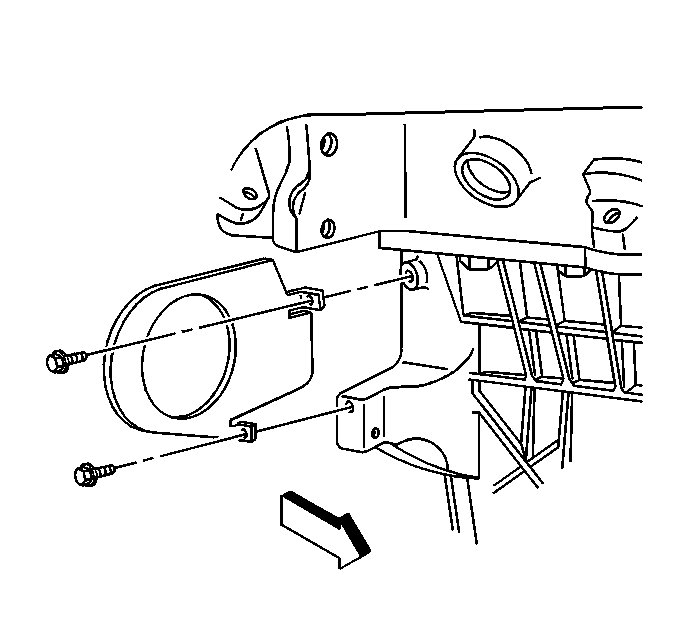
- Remove the transmission
cover.
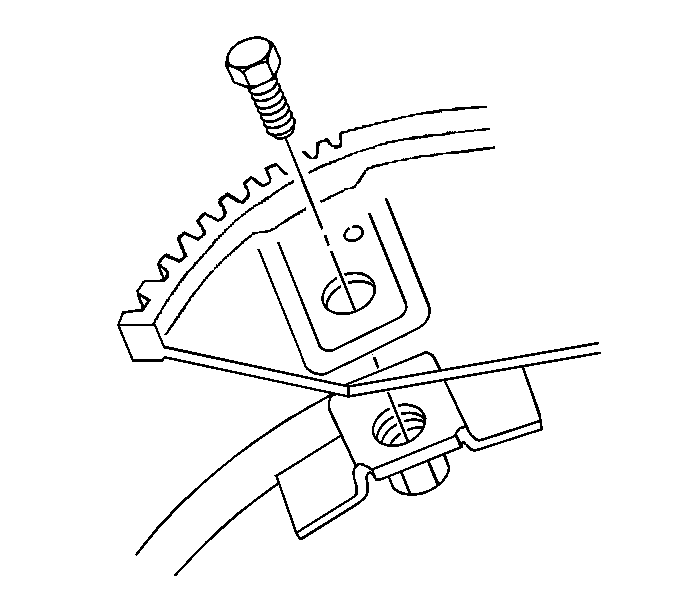
- Remove the torque converter
bolts from the flywheel through the transmission cover opening.
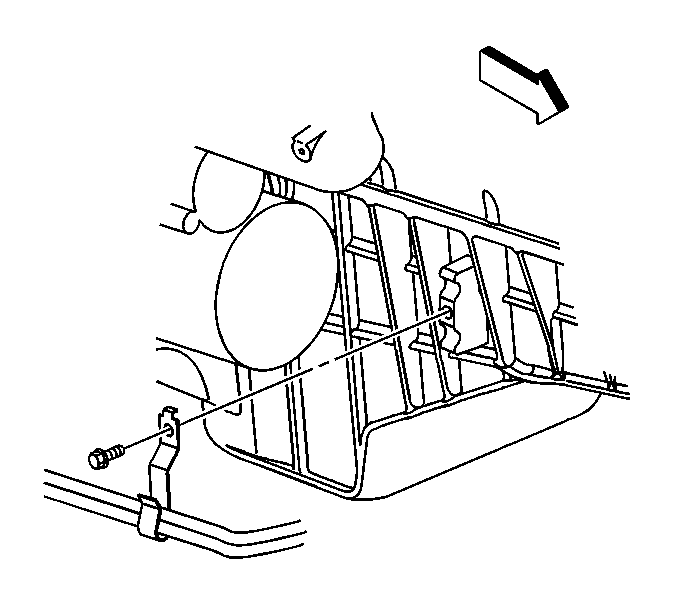
- Remove the transmission
cooler pipes from the engine.
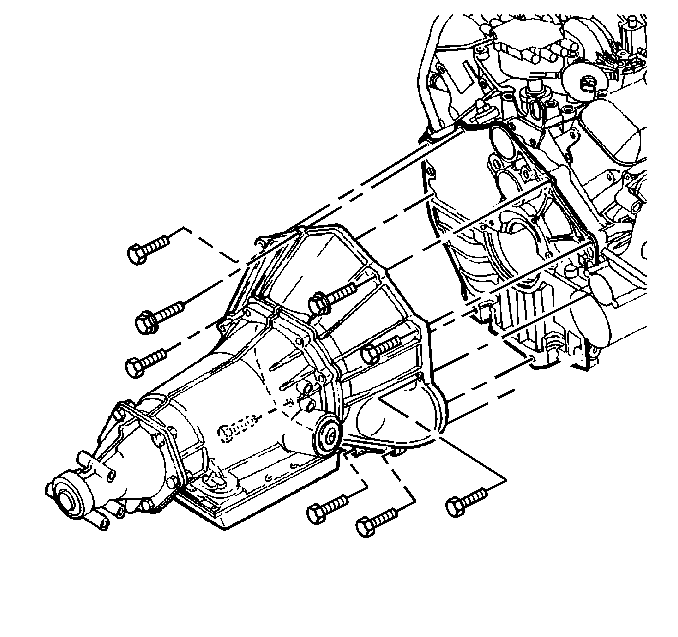
- Remove the bolts holding
the transmission to the engine except the top 2 bolts.
- Lower the vehicle.
- Support the transmission with a strap between the frame rails
or use a suitable transmission jack.
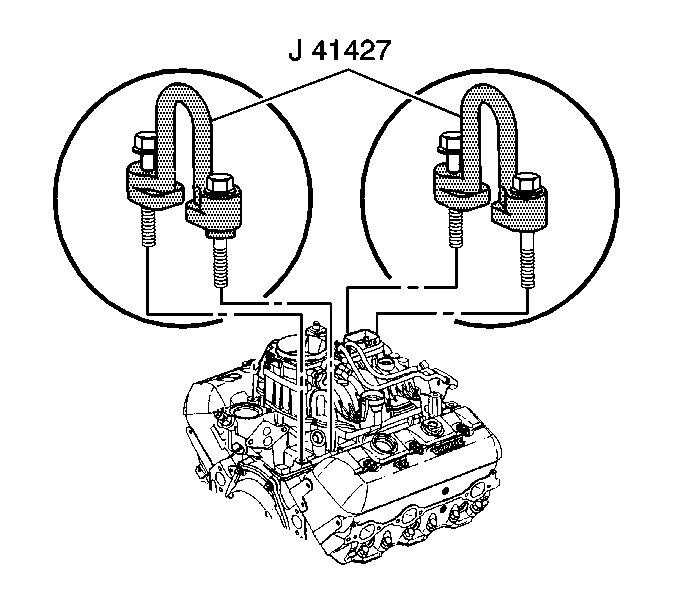
Notice: Use the correct fastener in the correct location. Replacement fasteners
must be the correct part number for that application. Fasteners requiring
replacement or fasteners requiring the use of thread locking compound or sealant
are identified in the service procedure. Do not use paints, lubricants, or
corrosion inhibitors on fasteners or fastener joint surfaces unless specified.
These coatings affect fastener torque and joint clamping force and may damage
the fastener. Use the correct tightening sequence and specifications when
installing fasteners in order to avoid damage to parts and systems.
- Install the J 41427
using the following procedure:
| 49.1. | Remove the 2 right rear lower intake manifold bolts. |
| 49.2. | Install the J 41427
marked RIGHT REAR. |
| 49.3. | Install the retaining bolts. |
Tighten
Tighten the retaining bolts to 15 N·m (11 lb ft).
| 49.4. | Remove the 2 left front lower intake manifold bolts. |
| 49.5. | Install the J 41427
marked LEFT FRONT with the arrow pointing to the front of the engine. |
| 49.6. | Install the retaining bolts. |
Tighten
Tighten the retaining bolts to 15 N·m (11 lb ft).
- Attach a suitable engine lifting device to the J 41427
.
- Remove the engine mounts from the engine mount frame brackets.
Refer to the following procedures:
- Remove the two remaining engine to transmission bolts.
- Remove the engine assembly from the vehicle.
Installation Procedure
- Install the engine assembly to the vehicle.
- Loosely install the 2 upper transmission to engine bolts.
- Install the engine mounts to the engine mount frame brackets.
Refer to the following procedures:
- Remove the engine lifting device.

- Remove the J 41427
from the engine.
- Apply thread lock GM P/N 12345382 or equivalent
to the threads of the lower intake manifold bolts.
Notice: Use the correct fastener in the correct location. Replacement fasteners
must be the correct part number for that application. Fasteners requiring
replacement or fasteners requiring the use of thread locking compound or sealant
are identified in the service procedure. Do not use paints, lubricants, or
corrosion inhibitors on fasteners or fastener joint surfaces unless specified.
These coatings affect fastener torque and joint clamping force and may damage
the fastener. Use the correct tightening sequence and specifications when
installing fasteners in order to avoid damage to parts and systems.
- Install the lower intake manifold bolts.
Tighten
- Tighten the bolts to 3 N·m (27 lb in).
- Tighten the bolts to 12 N·m (106 lb in).
- Tighten the bolts to 15 N·m (11 lb ft).
- Raise the vehicle. Refer to
Lifting and Jacking the Vehicle
in General Information.
- Install the remaining bolts from the transmission to the engine.
Refer to
Transmission Replacement
in
Automatic Transmission for location of the proper bolts and
tightening specifications.

- Install the bolt holding
the transmission cooler pipes bracket to the oil pan.
Tighten
Tighten the bolt to 9 N·m (80 lb in).
- Install the torque converter bolts to the flywheel.
Tighten
Tighten the bolts to 62 N·m (46 lb ft).

- Install the transmission
cover.
Tighten
Tighten the transmission cover bolts to 12 N·m (106 lb in).
- Install the starter motor. Refer to
Starter Motor Replacement
in Engine Electrical.
- Install the engine oil cooler pipes to the engine. Refer to
Engine Oil Cooler Hose/Pipe Replacement
in Engine
Cooling.
- Install the exhaust manifolds. Refer to the following procedures:
- Lower the vehicle.
- Install the AIR pipes to the engine. Refer to the following procedures:
- Install the upper intake manifold to the engine. Refer to
Upper Intake Manifold Replacement
.
- Install the EGR valve inlet pipe. Refer to
Exhaust Gas Recirculation Pipe Replacement
in Engine Controls.
- Install the spark plug wire harness retainer on the EGR valve
inlet pipe.

- Install the transmission
control cable bracket to the rear of the left cylinder head.
Tighten
Tighten the transmission control cable bracket bolts to 40 N·m
(30 lb ft).
- Install the distributor. Refer to
Distributor Replacement
in Engine Controls - 4.3L.
- Install the power steering pump with the rear bracket to the engine.
Refer to
Power Steering Pump Replacement
in
Power Steering Systems.
- Install the power steering pump mounting bracket.
- Install the A/C compressor pipes to the vehicle. Refer to
Compressor Hose Assembly Replacement
in Heating
Ventilation and Air Conditioning.
- Install the radiator inlet and outlet hoses to the engine. Refer
to the following procedures:
- Install the heater hoses to the engine. Refer to
Heater Inlet Hose Replacement
and
Heater Outlet Hose Replacement
in Heating Ventilation and Air
Conditioning.
- Install the generator mounting bracket.

- Install the stud and bolt
holding the ground wires to the rear of both cylinder heads.
Tighten
Tighten the bolt and the stud to 10 N·m (88 lb in).
- Install the nut holding the engine wiring harness at the transmission
to engine stud.
Tighten
Tighten the nut to 10 N·m (88 lb in).

- Connect the crankshaft
position (CKP) sensor (3).
- Install the engine wiring harness clip (1) from the stud on the
generator mounting bracket.
- Install the engine wiring harness clip (2) at the front of the
engine.

- Connect the following
electrical connectors:
| • | The fuel meter body assembly connector (1) |
| • | The EVAP canister purge solenoid valve (2) |
| • | The manifold absolute pressure (MAP) sensor (3) |

- Connect the following
electrical connectors:
| • | The engine oil pressure sensor (3) |
| • | The knock (KS) sensor (1) |

- Connect the following
electrical connectors:
| • | The throttle position (TP) sensor (1) |
| • | The idle air control (IAC) motor (2) |
| • | The engine coolant temperature (ECT) gage sensor (3) |
| • | The A/C high pressure switch (4), if equipped |

- Disconnect the following
electrical connectors:
| • | The A/C compressor clutch (1), if equipped |
| • | The engine coolant temperature (ECT) sensor (3) |
- Install the nut holding the ground wire (4) to the water
outlet stud.
Tighten
Tighten the nut to 10 N·m (88 lb in).

- Install the bolt holding
the battery negative cable and the ground strap to the front of the engine.
Tighten
Tighten the bolt to 25 N·m (18 lb ft).
Caution: In order to avoid possible injury or vehicle damage, always replace
the accelerator control cable with a NEW cable whenever you remove the engine
from the vehicle.
In order to avoid cruise control cable damage, position the cable out
of the way while you remove or install the engine. Do not pry
or lean against the cruise control cable and do not kink the cable. You must
replace a damaged cable.
- Install a NEW accelerator control cable. Refer to
Accelerator Control Cable Replacement
in Engine
Controls.
- Install the cruise control cable, if equipped to the throttle
shaft and the accelerator control cable bracket. Refer to
Cruise Control Cable Replacement
in Cruise Control.
- Install the fan clutch to the water pump. Refer to
Fan Clutch Replacement
in Engine Cooling.
- Install the radiator support. Refer to
Radiator Support Replacement
in Body Front End.
- Install the oil filter and fill the engine with engine oil. Refer
to
Engine Oil and Oil Filter Replacement
.
- Fill the cooling system with the proper quantity and type of coolant.
Refer to
Cooling System Draining and Filling
in
Engine Cooling.
- Recharge the A/C system. Refer to
Refrigerant Recovery and Recharging
in Heating Ventilation and
Air Conditioning.
- With the ignition OFF or disconnected, crank the engine several
times. Listen for any unusual noises or evidence that any of the parts are
binding.
- Start the engine and listen for unusual noises.
- Check the vehicle oil pressure gauge or light and confirm that
the engine has acceptable oil pressure.
If necessary, install
an oil pressure gauge and measure the engine oil pressure.
- Operate the engine at about 1,000 RPM until the engine
has reached normal operating temperature.
- Listen for improperly adjusted or sticking valves, sticking valve
lifters, or other unusual noises.
- Inspect for oil and/or coolant leaks while the engine is operating.
- Verify that the distributor is properly positioned.
- Perform a final inspection for the proper engine oil and coolant
levels.
- Install the engine cover. Refer to
Engine Cover Replacement
in Interior Trim.


























